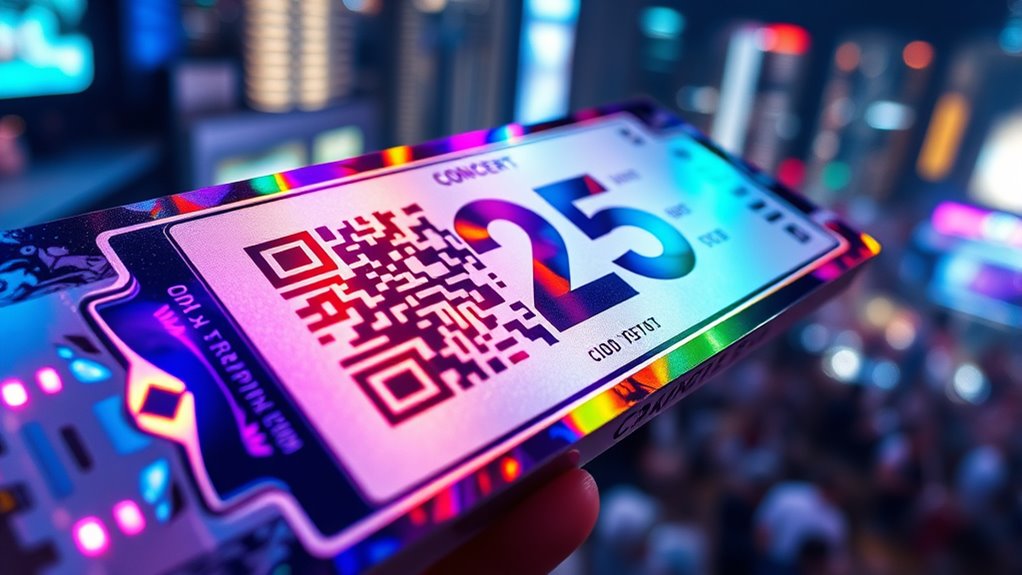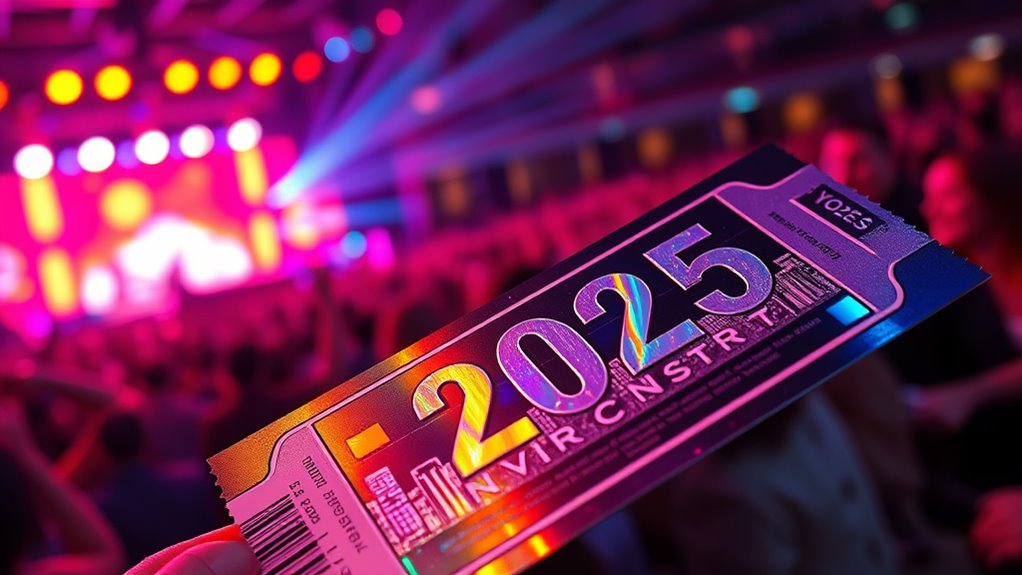In 2025, concert ticket prices are soaring because of a surge in live attendance and high demand for premium experiences. Fans are enthusiastic to spend more on unforgettable shows, pushing up industry revenue and ticket costs. Strategic pricing also plays a role, balancing affordability with new revenue streams from merchandise and VIP packages. If you want to understand how these factors are shaping ticket prices and what you can do, there’s more to explore ahead.
Key Takeaways
- Industry growth and increased demand have driven ticket prices higher despite economic uncertainties.
- Premium artist acts and high-demand events command significantly elevated resale and face-value prices.
- Diversification into merchandise and premium packages boosts revenue, allowing for higher ticket pricing.
- Market segmentation and fan loyalty strategies enable tiered pricing, including accessible and luxury options.
- Technological and material innovations enhance fan experience, justifying and supporting increased ticket costs.

Despite economic uncertainties, the live music scene in 2025 is thriving, with concert attendance surging by over 32%. This boom has reshaped how artists and venues approach ticket sales, merchandise, and overall pricing strategies. Fans are willing to spend more on live experiences, but that doesn’t mean prices are soaring without limits. Instead, organizers are carefully balancing ticket affordability with revenue growth, leading to interesting trends like lower average ticket prices—around $120—despite a 24.9% increase in revenue per concert. This strategic move helps maintain fan loyalty by keeping concerts accessible while still maximizing profits through merchandise sales and premium offers. Ticket sales in H1 2025 averaged 14,229 tickets, a 32.1% increase from last year. Additionally, the use of hydrocolloid technology in merchandise and promotional materials has enhanced the overall fan experience, reflecting a broader trend of integrating innovative materials in the industry.
Concert attendance up 32% in 2025, with strategic pricing and merchandise boosting revenue while keeping shows accessible.
You’ll notice that merchandise pricing plays a pivotal role in this ecosystem. Artists and promoters now rely heavily on merchandise sales at shows, often pricing items to appeal to dedicated fans. This approach not only boosts revenue but also reinforces fan loyalty, as loyal followers are more likely to purchase exclusive or limited-edition merchandise. The combination of accessible ticket prices and appealing merchandise creates a compelling value proposition, encouraging fans to attend more shows and spend more during each event. It’s a smart way to generate additional income without alienating cost-sensitive fans, who might be discouraged by high ticket prices alone.
Meanwhile, ticket prices vary remarkably depending on the artist, venue size, and demand. High-profile acts like Beyoncé and The Eagles command premium prices—sometimes exceeding $1,800 in resale markets—yet many fans still attend due to their loyalty or the prestige of the event. This disparity in pricing strategies reflects a deliberate segmentation: affordable tickets for most, luxury tiers for superfans willing to pay a premium for front-row seats or VIP packages. The result is a vibrant, diverse market where fans can choose their level of investment, reinforcing loyalty across different segments.
Some fans are frustrated by the rapid price hikes, especially during presale phases when ticket prices can triple within hours. For example, Beyoncé’s 2025 UK tour showed dramatic inflation, with top-tier seats reaching nearly £950. Nonetheless, the overall trend leans toward keeping average ticket prices affordable to sustain broad attendance. This balance allows artists and promoters to maximize revenue through merchandise, premium offerings, and resale markets while maintaining a core base of loyal fans who see value in attending live shows. Ultimately, the concert experience in 2025 hinges on this delicate interplay between pricing, loyalty, and revenue diversification.
Frequently Asked Questions
Will Ticket Prices Decrease After the Initial Surge?
You might wonder if ticket prices will drop after the initial surge. With dynamic pricing and market speculation, prices could fluctuate based on demand, making drops possible but not guaranteed. Artists and venues use these strategies to optimize revenue, so prices may stay high or even increase further if demand remains strong. Stay flexible and watch for sales or discounts, but don’t expect a quick, steady decline anytime soon.
How Do Resale Markets Affect Ticket Pricing?
Resale markets are like a tug-of-war, pulling ticket prices higher through secondary market activity. When scalper tactics flood the scene, they inflate prices for in-demand events, making tickets more expensive. This dynamic creates a ripple effect, pushing original prices up and influencing how fans buy or wait. You’ll notice that as resale prices rise, so do the overall ticket costs, driven by increased demand and strategic scalper moves.
Are There Any Affordable Ticket Options Available?
You can still find affordable tickets if you look for discounted packages and student discounts. Venues and artists often offer early bird specials or promotions that help you save. Choosing seats further from the stage or opting for smaller venues can also lower costs. Keep an eye on official sales and authorized resale sites, as these often provide more budget-friendly options, making attending live shows more accessible.
How Does Artist Popularity Influence Ticket Costs?
Think of artist popularity as a magnet pulling fans closer, making demand grow stronger. When your favorite artist’s demand skyrockets, ticket costs climb, especially for front-row seats that symbolize VIP status. Fan loyalty fuels this cycle, encouraging higher prices as fans are willing to pay more for exclusive access. So, the more popular an artist, the higher the ticket prices, because their star power turns loyalty into premium value.
What Technological Changes Are Impacting Ticket Sales?
You see technological changes like virtual entry and biometric scanning transforming ticket sales. These innovations make entry faster and more secure, reducing fraud and scalping. Dynamic pricing algorithms and AI analytics optimize ticket prices based on demand, while digital wallets streamline purchases. Combined, these tech advances create a smoother buying experience, but also contribute to rising prices, as artists and venues leverage new tools to maximize revenue and manage demand effectively.
Conclusion
So, next time you enthusiastically buy concert tickets in 2025, remember—you’re paying for a show that’s become more exclusive than ever. The rising prices might just turn big concerts into luxury experiences for the few, not the many. Ironically, as ticket costs soar, the thrill of live music could become a rare treat. But hey, at least you’ll have a story to tell about that once-in-a-lifetime, sky-high ticket you splurged on!










